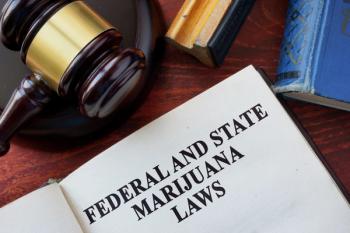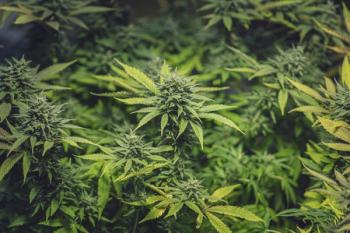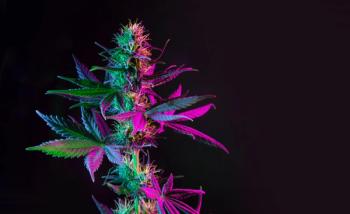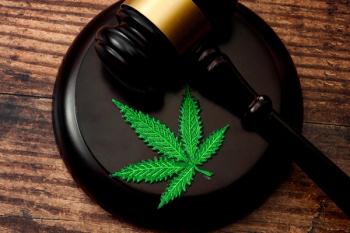
Mental Health and CBD: What's the Latest Info
Drug Topics® is joined by Dr. Alex Capano, Chief Science Officer at Ananda Professional to discuss what CBD is used for mental health, where research should go next, and how to ensure that patients are getting effective CBD products.
Drug Topics®: Hello and welcome to Over the Counter, a podcast from Drug Topics. In this episode made in partnership with Ananda Professional, we're joined by Dr. Alex Capano, who is Chief Science Officer at Ananda Professional to discuss what CBD is used for in mental health, where research should go next, and how to ensure that patients are getting effective CBD products. What is the role of CBD in mental health?
Alex Capano: The most common reason people use CBD across the board and particularly in mental health is for anxiety, but that's not the only role it has. It's certainly an option for treatment, or an adjunct for treatment, for folks with PTSD. We see that it specifically reduces nightmares associated with PTSD. It can even be used for folks who have social phobia disorders. So not your generalized anxiety disorders, but actually just social phobia. Then we're actually seeing some really interesting work and data come up on things like ADHD, Alzheimer's, and other psychiatric conditions.
Drug Topics: What are some conditions that CBD is commonly used with?
Capano: Most commonly is definitely anxiety. For a number of reasons, it works and also anxiety is quite common, unfortunately. We do have a good amount of data, evaluating CBD’s safety and efficacy in anxiety. So that's the most common reason.
Drug Topics: Are there some conditions where CBD isn't a good fit for use?
Capano: Interestingly, I don't think that CBD is great for major depressive disorder, where anxiety is not a component of it. If there's a depressive issue and anxiety is a component, which often happens, CBD can certainly help with anxiety. But the Depression itself, I'm really not compelled by the data. I actually think that there are other plant-based medicines or options, and even psychedelics, that are much more promising in treating depression versus CBD. It's not that it's dangerous. I just don't see the efficacy as compelling as other options. It's really not going to replace an SSRI for many people, unless they're using that only for anxiety, which is atypical.
CBD is not a problem in this case, I want to be clear about that, but some CBD products do have low levels of THC in them. I think it's important to mention that THC should not be used, without really good reason and weighing the pros and cons, in anyone whose frontal lobe is not fully developed, because it can slow the maturation of the frontal lobe, so really between 21 and 25. Then you're not going to do anything to your frontal lobe because it is what it is. So, I caution THC use in younger patients. Also if anyone has a predisposition, a family history, or even a personal history of psychosis, schizophrenia, or bipolar disorder, THC can actually aggravate that and increase the likelihood of that recurring or sort of turning that switch on with the predisposition. So again, CBD is not a concern for that. It does not work in the brain in the same way, but if you are in that camp, you certainly want to get a CBD product that does not have THC on it.
Drug Topics: So as you mentioned, a lot of people use CBD for anxiety. What's known about why it's so efficacious in helping alleviate anxiety?
Capano: Well, if we look at studies, there's a handful, and more coming out, of studies that look primarily at anxiety and overall they see an improvement in anxiety, both in the acute phase, in social phobia, for example, but also long term, after a month or a couple months of use, or even just a couple of weeks. We also see a lot of studies where anxiety may not be the primary outcome they're measuring, maybe that's pain or sleep or something else, but they're measuring anxiety as well. And then we see that secondary outcome where anxiety has a statistically significant improvement. There's really dozens of studies that measure anxiety as a secondary outcome. If you're asking how it works, the truth is, I don't think we fully understand all of the mechanisms of CBD yet. I know we don't. And I don't know if we really ever will in my lifetime.
Two ways it helps with anxiety that we do know are it activates and increases the activity of the 5-HT1A serotonin receptor, which is associated with anxiety, also with nausea. So that's one of the ways and then another way it improves anxiety is by increasing one of our endogenous cannabinoids, so ones that we make in our brain on our own. It's a neurotransmitter known as anandamide. And the anandamide is actually named after the word ‘ananda’ in Sanskrit and many languages, which means bliss, because this neurotransmitter makes us feel really good. It's associated with improved mood and a decrease in anxiety responses. We don't make a whole lot of it and then our body sorts of eats it up really quickly, and it goes away. So CBD, that enzyme that eats up anandamide, it basically inhibits it. So by inhibiting the enzyme that eats up anandamide, it prolongs its half-life, and just gives you more of your bliss neurotransmitter, in your body circulating, giving you that blissful feeling. Those are the mechanisms that I feel very confident about. I'm sure we will discover more over time.
Drug Topics: How can pharmacists ensure that customers are safely using CBD products?
Capano: Well, picking a transparent, quality-assured CBD products. So you know they are using what you want them to use, that it's CBD, and that's the right dose of CBD. That there's not any contaminants or really high doses of THC in there that should not be in hemp products, because it wouldn't be legal, and it could actually exacerbate a lot of different psychiatric conditions. Once you've done due diligence to put a good product in your store, and recommend it, really guiding patients on dosing. Start low, go slow. I feel like I say that all the time and it is industry standard, but it's really best practice. You want to see how you respond to this. I recommend that folks try it at night, at home, a couple hours before bed the first time just to see: are they really sensitive? do they get drowsy from it? Because if that's the case, then they don't want to take it in the morning on their drive to work. So timing of dosing, slowly titrating up to really find that sweet spot because this is a bell-shaped dose response curve. More is not always better. This is truly personalized medicine. Although the therapeutic range is not that large. So it doesn't really take a long time to titrate to that optimal dose.
And then consider other medications that people are on. CBD is metabolized through CYP450 enzymes. So are over 50% of medications that are prescription and nonprescription. People often worry about drug interactions. I understand that. The reality is drug interactions with CBD don't occur, so far that anything that we've seen in the data, until very, very high doses. Super therapeutic doses that don't really reflect real-world use, outside of controlling severe pediatric seizures and even then they're pretty benign. Evaluate the other medications, talk to the patients about possible signs of an interaction, but have confidence that the doses almost everyone is taking for an over-the-counter product are 10 to 100 times below what we see as a dose that actually causes any meaningful interaction with other medications that are metabolized through CYP450.
The one medication that's always a problem is blood thinners. If you have someone on blood thinners and they're using CBD, again, it's fine. You still have that really nice wiggle room, It does seem that it's the one class that there's a lower threshold for the interaction, but that threshold is seen at 10 milligrams per kilogram of body weight, for that patient. I don't know anyone who's taking 10 milligrams per kilogram of CBD, that's really, really high. Again have that reassurance, but tell them ‘this isn't the week or the 2 weeks, to not check your INR, your PT, however, you're measuring the efficacy of your blood thinner.’ If you see a change, come back and dose adjust. It doesn't mean it's a contraindication. You just want to watch it and adjust as necessary. You may need to decrease blood thinners over time.
Drug Topics: What questions about using CBD in mental health care do you think should be a research priority?
Capano: I had 2 really fascinating things come to mind for me. One is I think that we should start looking at, and we are starting to starting to, CBD as prevention. Not just treatment, but actually preventative medicine for neurodegenerative diseases like Alzheimer's and other dementia forms. There's some pretty convincing evidence out there in animals and many researchers are looking at it in humans right now. Can this actually, not just treat the symptoms associated with Alzheimer's dementia, but can it actually prevent or slow the process in the first place? I think that is really important. Alzheimer's is on the rise globally. We want to live well and live well longer. It's not just about lifespan, because we're living longer than ever. It's really about healthspan. Someone said that to me recently and I thought that was a great way to put it. I think preventative medicine to keep our brains as healthy as our bodies.
Then also, similar to neurodegenerative disorders is postconcussion syndrome or chronic traumatic encephalopathy (CTE). This is really common. Even high school athletes playing football, playing soccer, they get these repeated concussions, even if they're minor concussions. One study showed that 99 out of 100 football players, not even all professional, had signs in their brain of CTE or postconcussion syndrome. There's also data that having CBD onboard, reduces the negative impacts of those injuries, both acutely and chronically. I think that this is something that's really scary. We're seeing and hearing more and more about it. I think, looking at prevention, if somebody is an athlete or is at risk of repeated head injury or impact, that they are using something to preserve the health of their brain long term.
Drug Topics: And what has research uncovered about CBD in the mental health care space that you found surprising?
Capano: I think the research in pediatric psych has surprised me. I hope it continues to be a priority for the folks who have started looking at this. There are research groups and institutions evaluating CBD as an option for people, primarily children, with ADHD and seeing that it's much better tolerated and actually effective, or at least as effective as many of the stimulants that are commonly used. They're finding the same outcomes in autism spectrum disorder. ADHD, autism spectrum disorder, you could argue, it's sort of the same spectrum. I've been surprised, and pleasantly surprised, at the promising outcomes in the data, using CBD in the pediatric population for those very common disorders. I'm pleasantly surprised. I hope to see even more of it, but I think in pediatrics, we need better options that are going to keep our kids feeling like themselves and able to thrive. I think we're going to see that CBD is a viable therapeutic alternative here.
Drug Topics: And as always, thank you for listening, and we hope to see you next time, at the counter.
Newsletter
Pharmacy practice is always changing. Stay ahead of the curve with the Drug Topics newsletter and get the latest drug information, industry trends, and patient care tips.























